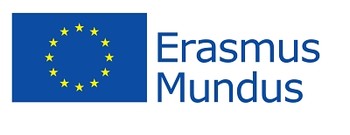Study Programmes
Degree programmes in English and other languages
Palacký University offers various degree programmes at three levels - Bachelor's, Master's and Doctoral. You can find more detailed information by choosing your programme in our catalogue.
Erasmus Mundus

Palacky University proudly participates in Erasmus Mundus Joint Masters programme. Erasmus Mundus Joint Masters are prestigious international masters, jointly designed and delivered by a group of higher education institutions. They involve at least 3 institutions from at least 3 different countries, and multiple associated partners from the academic and non-academic world. Typically, they include periods of study, research, traineeship, thesis preparation and defence.
GLODEP

Palacký University is in the role of the leading university involved in the implementation of the master's programme "joint degree" GLOBAL DEVELOPMENT POLICY (GLODEP).
GLODEP is a two-year programme aimed at training professionals in the field of international development. Graduates will find employment in public administration, in international organizations, in the non-profit sector or business focused on development policies and practices.
The programme will give students from all over the world the opportunity to study at three European universities that are part of the GLODEP consortium, namely Palacký University in Olomouc, Université Clermont Auvergne (France) and Università degli studi di Pavia (Italy). The fourth semester is then dedicated to practice or research at partner institutions around the world.
About 15 scholarships (Erasmus Mundus Joint Master Degree scholarship) covering tuition fees, insurance and travel and living expenses are prepared for students entering the next academic year.
The application deadline for every academic year is 31 January for students applying for a scholarship and 30 April for fee-paying students.
More information can be found at www.glodep.eu, in case of questions write to study@glodep.eu.
Digital Earth

Palacký University offers, in cooperation with Lodron Paris University of Salzburg (Austria) and the University of South Brittany (France), the joint master's programme COPERNICUS DIGITAL EARTH.
CDE is one of two prestigious EU-funded Erasmus Mundus programs focused on information technology in geosciences. The CDE study enables the students to acquire or deepen knowledge and skills in geoinformation technologies and geovisualization at three European universities. The first two semesters are taught in Salzburg, the fourth and fifth semesters students stay and write their diploma thesis according to the chosen specialization either in Olomouc (GeoVisualization and Geocommunication) or in Vannes (GeoData Science) in France.
For the academic year 2022/23, the programme has 16 scholarships (Erasmus Mundus Joint Master Degree scholarship) covering tuition fees, insurance and travel and living expenses. The CDE programme has been offered by Palacký University for the third year already.
More information can be found at https://www.master-cde.eu/, in case of questions write to barbara.brunner@plus.ac.at or jakub.konicek@upol.cz.
Euroculture

For many years, Palacký University has been part of the jointly implemented master's programme SOCIETY, POLITICS AND CULTURE IN GLOBAL CONTEXT: EUROCULTURE, the so-called "joint master degree".
EUROCULTURE is a two-year interdisciplinary international programme of a consortium of eight European universities (Universidad de Deusto, Spain; Rijksuniversiteit Groningen, Netherlands; Georg-August Universität Göttingen, Germany; Uniwersytet Jagiellonski w Krakowie, Poland; Uppsala Universiteit, Sweden; Université de Strasbourg, France; Universita degli Studi di Udine, Italy). The programme focuses on cultural and social developments in Europe, the question of European identity, values, citizenship and cultural relations. Students spend the first two semesters at two selected universities in Europe.
For each academic year, the programme has 22 Erasmus Mundus scholarships (Erasmus Mundus Joint Master Degree scholarship) covering tuition fees, insurance, travel and living expenses. The EUROCULTURE programme receives financial support from the European Union repeatedly. In 2020, the programme also received European accreditation. Palacký University has been part of the EUROCULTURE programme for more than 15 years.
The universal application deadline for the new academic year is from 1 October to 15 January - for students applying for an Erasmus Mundus scholarship and 1 May for self-paying students.
More information can be found at https://www.euroculturemaster.eu/ or https://www.euroculture.upol.cz. In case of questions, write to euroculture@upol.cz.
Exchange students
Information for students interested in an exchange study stays under the Erasmus+ Programme or Cooperation Agreements. A prerequisite for your application is the bilateral agreement between your home university and Palacký University concerning the subject you are studying. More information is available from the Erasmus/Mobility office at your home institution.
Under the umbrella of Erasmus+ you can apply for traditional EU Erasmus exchange (KA131), non-EU Erasmus exchange (the International Credit Mobility, KA171), and Aurora Programme.
For information about the Orientation Week, please visit this section.
Students arriving for a study exchange through programmes mentioned below are nominated and submit their application in the Erasmus+ application:
- Erasmus+ semester(s) mobility (Europe)
- Erasmus+ short-term blended intensive program BIP
- Erasmus+ short-term doctoral mobility
- Erasmus+ short-term blended mobility
- Erasmus+ International Credit mobility (non-Europe)
- Erasmus+ International Credit mobility short-term doctoral mobility
- Erasmus+ International Credit mobility short-term blended mobility
- Cooperation Agreements
Short-Term Programmes & Summer Schools
See our current offer of short-term programmes and summer schools in English
